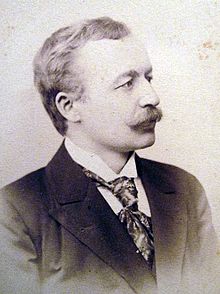Ossyp Makowej
Ossyp Stepanowytsch Makowej ( Ukrainian Осип Степанович Маковей; born August 23, 1867 in Jaworiw , Kingdom of Galicia and Lodomeria ; † August 21, 1925 in Salishchyky , Galicia ) was a Ukrainian writer , literary scholar and translator .
Life
As the son of a furrier , Makowej attended elementary school in his birthplace and from 1879 to 1887 the grammar school in Lemberg . He then studied at the philosophical faculty of the University of Lemberg (polonized in 1863) .
After completing his studies, Makowej devoted himself to journalism, first as an employee of the Lviv "Zorija" , then from 1895 as the editor-in-chief of the "Bukowyna" , which he helped to achieve a wider response in the Slavic world. In 1897 he was appointed editor of the new magazine "Literaturnonaukowyj visnyk" to Lviv, where he worked with Iwan Franko , Mychajlo Pawlyk , Volodymyr Hnatjuk and Mychajlo Hruschewskyj .
In the spring of 1899 Makowej received a state scholarship for young writers at the University of Vienna . With Vatroslav Jagić he wrote a work on the poem "Osman" by the Croatian poet Ivan Gundulić . It describes the struggle of the Poles and the Zaporozhian Cossacks against the Turks in the Ottoman-Polish War 1620–1621 and the victorious battle of Chocim .
In 1899 Makowej returned to Bukovina and taught at the teachers' seminar and later also at the Franz Joseph University Ukrainian Studies .
With a dissertation on Ukrainian poets Panteleimon Kulish doctorate Makowej 1902 Dr. phil. He contributed a lot to the popularization of the works of the Bukovinian poets Jurij Fedkowytsch , Isidor Worobkiewicz , Olha Kobyljanska and others . He published the collected works of Fedkowytsch and Worobkiewicz and wrote on the work and life of Fedkowytsch.
In 1910 Makowej left Czernowitz because of tensions with some leaders of Ukrainian circles whom he had scourged in his satirical works. Until 1913 he lived again in Lemberg, where he taught at the girls' high school. In 1913 he became director of the teachers' college in the Galician town of Salishchyky, where he stayed until the end of his life after the war was interrupted.
During the First World War he was an interpreter and post censor for the Imperial and Royal Army . In his poems, novels and sketches from the war and post-war years, he described the horror of fighting at the front and the tragic fate of Russian and Austrian Ukrainians who felt like ethnic brothers and yet had to shoot at each other ( “Bloody Field” , 1921).
In February 1921 he was imprisoned by the Polish authorities in Czortkow prison for a few weeks because he had "Ukrainized" his grammar school.
In Chernivtsi there are memorial plaques on the building of the former teachers' college and on the house in the former Dreifaltigkeitsgasse (today Bohdan-Khmelnyzkyj-Straße) .
plant
The first literary attempts fall during the Lviv student days. He published his adaptations of Ovid and Heine and the poem “Verbotene Äpfel” , still written on the school desk, in the magazine “Zorija” . “Gedichte” (1895), “Reise nach Kiev” (1897) and “Der Winselaffe” (1911) appeared in leading Ukrainian magazines and almanacs . This satirical poem was directed against pseudo-patriotic Galician politicians (Rychlo and Liubkivskyj, 2009). Several poetic cycles appeared in periodicals : "Trauer und Mockery" (1896), "Thoughts in the Mountains" (1899), "Views" (1905) and "Strophes" (1911).
Since the end of the 19th century, Makowej has mainly written prose , such as the volumes of short stories "Spring Storms " (1895), "Savèchya's Worries" (1896), "Our Acquaintances" (1901), "Stories" (1904), "Yaroshenko" ( 1905) and “Hermit from Putna” (1909). In his stories and novellas, Makowej described the difficult life of Galician and Bukovinian farmers, the everyday life of the inhabitants of small towns and pictures of the Ukrainian past.
Makowej translated from several languages into Ukrainian and enriched Ukrainian literature with his interpretations of the works of Polish, German, Austrian, Danish, French and Anglo-American authors: Adam Mickiewicz , Henryk Sienkiewicz , Eliza Orzeszkowa , Stefan Żeromski ; Heinrich Heine , Conrad Ferdinand Meyer ; Hermann Sudermann , Marie von Ebner-Eschenbach ; Jákup Jakobsen ; Guy de Maupassant , Alphonse Daudet , Émile Zola ; Mark Twain , Jerome K. Jerome .
literature
- Peter Rychlo , Oleg Liubkivskyj: Chernivtsi City of Literature , 2nd edition. Chernivtsi 2009, pp. 81–87.
Web links
Individual evidence
- ↑ Materials on the biography of Ossyp-Jurij Hordynskyj Fedkowicz (1910)
- ↑ Biography of Ossyp-Jurij Hordynskyj Fedkowicz (1911)
| personal data | |
|---|---|
| SURNAME | Makowej, Ossyp |
| ALTERNATIVE NAMES | Makowej, Ossyp Stepanowytsch; Makovej, Osyp Stepanovyč |
| BRIEF DESCRIPTION | Ukrainian poet and translator |
| DATE OF BIRTH | August 23, 1867 |
| PLACE OF BIRTH | Yaworiw , Galicia |
| DATE OF DEATH | August 21, 1925 |
| Place of death | Salishchyky , Galicia |
